Related Research Articles
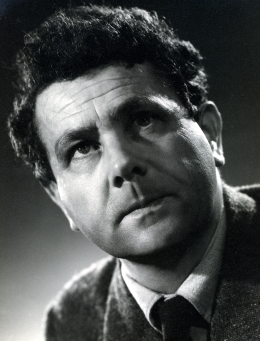
Gerald Raphael Finzi was a British composer. Finzi is best known as a choral composer, but also wrote in other genres. Large-scale compositions by Finzi include the cantata Dies natalis for solo voice and string orchestra, and his concertos for cello and clarinet.

Ernest Bristow Farrar was an English composer, pianist and organist.

Painswick is a town and civil parish in the Stroud District in Gloucestershire, England. Originally the town grew from the wool trade, but it is now best known for its parish church's yew trees and the local Rococo Garden. The village is mainly constructed of locally quarried Cotswold stone. Many of the buildings feature south-facing attic rooms once used as weavers' workshops.
Christopher "Kiffer" Finzi was a British orchestral conductor. He was the son of composer Gerald Finzi and artist Joyce Black.
Joy Finzi was a British artist and founder of the Finzi Trust, a foundation named for her husband, composer Gerald Finzi.
Dies Natalis, Op. 8, is a five-movement solo cantata composed in 1938–1939 by the twentieth-century English composer Gerald Finzi (1901–1956). It is a solo vocal cantata scored for a solo soprano or tenor accompanied by string orchestra, and features settings of four texts by Thomas Traherne (1636/37–1674), a seventeenth-century English Metaphysical poet, priest and theologian.
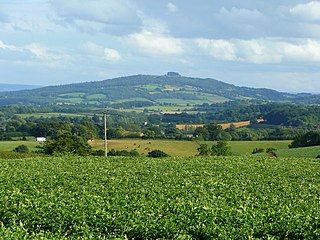
May Hill is a prominent English hill between Gloucester and Ross-on-Wye. Its summit, on the western edge of Gloucestershire and its northern slopes in Herefordshire, is distinguishable by a clump of trees on its summit, which forms an official Site of Special Scientific Interest. It is reached by three public footpaths, two as parts of the Gloucestershire Way and Wysis Way.

Reginald Owen Morris, known professionally and by his friends by his initials, as R.O. Morris, was a British composer and teacher.
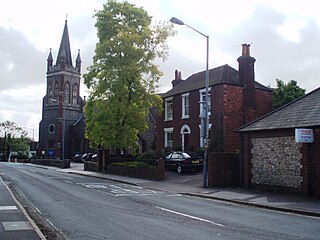
Wilfred Brown was an accomplished English tenor.
"The Language of Flowers" is an unpublished song from a poem by the American geologist and poet James Gates Percival, with music written by the English composer Edward Elgar when he was only fourteen years old.

Kenneth Leighton was a British composer and pianist. His compositions include church and choral music, pieces for piano, organ, cello, oboe and other instruments, chamber music, concertos, symphonies, and an opera. He had various academic appointments in the Universities of Leeds, Oxford and, primarily, Edinburgh.
Duett for trombone and double bass is a musical work by the English composer Edward Elgar.

Herbert Richard Lambert, FRPS, was a British portrait photographer known for his portrayals of professional musicians and composers including Gustav Holst.
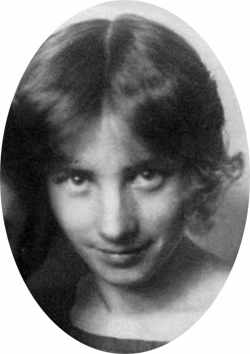
Sophie Adele Wyss was a Swiss soprano who made her career as a concert singer and broadcaster in the UK. She was noted for her performances of French works, many of them new to Britain, for giving the world premieres of Benjamin Britten's orchestral song cycles Our Hunting Fathers (1936) and Les Illuminations (1940), and for encouraging other composers to set English and French texts. Among those who wrote for her were Lennox Berkeley, Arnold Cooke, Roberto Gerhard, Elizabeth Maconchy, Peter Racine Fricker, Alan Rawsthorne and Mátyás Seiber.
This is a summary of 1944 in music in the United Kingdom.
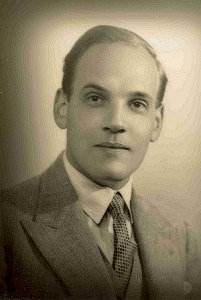
William Busch was a British composer and musician. Busch studied music in London, Berlin and the United States. His composition teachers included John Ireland and Bernard van Dieren. He worked as a concert pianist before devoting himself more to music composition. But his pacifism during World War II resulted in decreased reception for his works during this time.
Stephen David Banfield is a musicologist, music historian and retired academic. He was Elgar Professor of Music at the University of Birmingham from 1992 to 2003, and then Stanley Hugh Badock Professor of Music at the University of Bristol from 2003 to his retirement at the end of 2012; he has since been an emeritus professor at Bristol.
This is a summary of 1901 in music in the United Kingdom.
By Footpath and Stile is a song cycle for baritone and string quartet by English composer Gerald Finzi (1901-1956) set to poems by Thomas Hardy (1840-1928). Composed between 1921 and 1922, it was first performed in 1923 and published in 1925.
References
- 1 2 International Who's who in Music and Musicians' Directory. Melrose Press. 1994. p. 695.
- ↑ McVeagh, Diana (2021). Gerald Finzi's Letters, 1915-1956. [S.l.]: Boydell Press. ISBN 9781783275724.
- ↑ Tim Rayborn (6 April 2016). A New English Music: Composers and Folk Traditions in England's Musical Renaissance from the Late 19th to the Mid-20th Century. McFarland. ISBN 978-0-7864-9634-1.
- ↑ McVeagh, Diana M. (2005). Gerald Finzi: his life and music. Woodbridge: Boydell Press. ISBN 9781843831709.
- ↑ Paul-André Bempéchat (2005). Liber Amicorum Isabelle Cazeaux: Symbols, Parallels and Discoveries in Her Honor. Pendragon Press. p. 344. ISBN 978-1-57647-091-6.
- ↑ "Diana McVeagh Prize for Best Book on British Music". North American British Music Studies Association. Retrieved 16 December 2020.